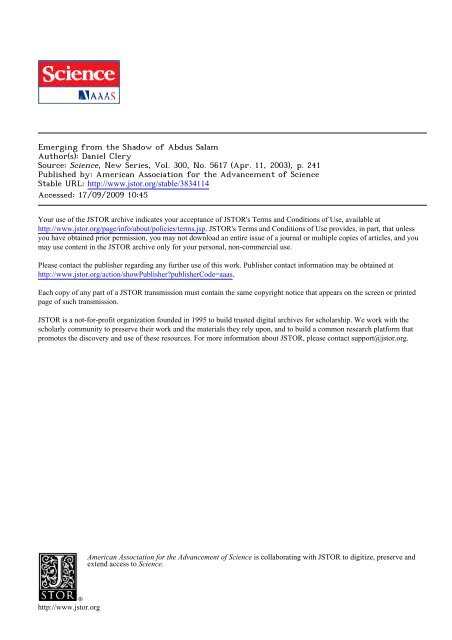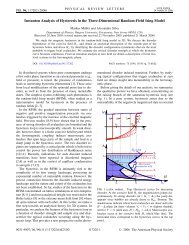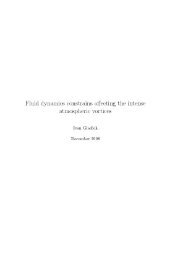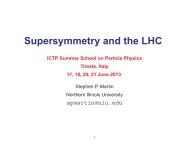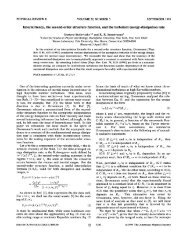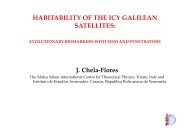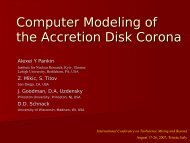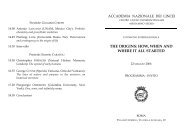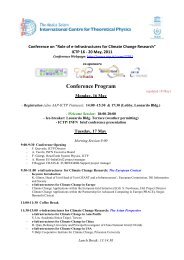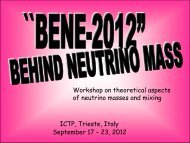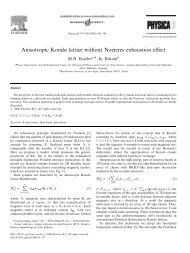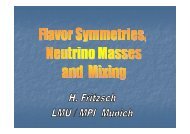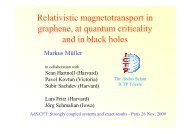download - ICTP
download - ICTP
download - ICTP
You also want an ePaper? Increase the reach of your titles
YUMPU automatically turns print PDFs into web optimized ePapers that Google loves.
Emerging from the Shadow of Abdus Salam<br />
Author(s): Daniel Clery<br />
Source: Science, New Series, Vol. 300, No. 5617 (Apr. 11, 2003), p. 241<br />
Published by: American Association for the Advancement of Science<br />
Stable URL: http://www.jstor.org/stable/3834114<br />
Accessed: 17/09/2009 10:45<br />
Your use of the JSTOR archive indicates your acceptance of JSTOR's Terms and Conditions of Use, available at<br />
http://www.jstor.org/page/info/about/policies/terms.jsp. JSTOR's Terms and Conditions of Use provides, in part, that unless<br />
you have obtained prior permission, you may not <strong>download</strong> an entire issue of a journal or multiple copies of articles, and you<br />
may use content in the JSTOR archive only for your personal, non-commercial use.<br />
Please contact the publisher regarding any further use of this work. Publisher contact information may be obtained at<br />
http://www.jstor.org/action/showPublisher?publisherCode=aaas.<br />
Each copy of any part of a JSTOR transmission must contain the same copyright notice that appears on the screen or printed<br />
page of such transmission.<br />
JSTOR is a not-for-profit organization founded in 1995 to build trusted digital archives for scholarship. We work with the<br />
scholarly community to preserve their work and the materials they rely upon, and to build a common research platform that<br />
promotes the discovery and use of these resources. For more information about JSTOR, please contact support@jstor.org.<br />
http://www.jstor.org<br />
American Association for the Advancement of Science is collaborating with JSTOR to digitize, preserve and<br />
extend access to Science.
U~ U~ ~ u ~ U f .W u~0 Ut I<br />
Emerging From the Shadow<br />
Of Abdus Salam<br />
Once a scientific oasis during the Cold War, a unique center for theoretical physics and its<br />
scientific neighbors in Trieste want to honor after his death in 1996. Salam remains a<br />
formidable presence. His former office is<br />
something of a shrine: Bookshelves are<br />
glassed in to keep the volumes as he left them,<br />
while other glass cases preserve his walking<br />
sticks, prayer mat, and scores of awards and<br />
honors from across the globe. "Salam became<br />
update their missions for today's political climate a demigod," says Sreenivasan. "He cared for<br />
what he was doing. But he has made it difficult<br />
TRIESTE, ITALY-Arbab Ibrahim Arbab had took over as <strong>ICTP</strong> director last month and is for his successors."<br />
reached a dead end. He'd earned a bachelor's cautiously exploring ways to reinvigorate it. Despite the U.N. badge, 85% of <strong>ICTP</strong>'s<br />
degree at the University of Khartoum, Sudan,<br />
$22.5 million annual budget comes from the<br />
in the early 1990s but was unable to continue Einstein's dream<br />
Italian government. Italy views the center as<br />
his studies in astrophysics. "There is hardly After World War II, several prominent physi- an important foreign policy tool and, in 1983,<br />
any money for research in Sudan," he ex- cists, including Albert Einstein, Robert was happy to add the International Centre for<br />
plains. Then one of his former professors sug- Oppenheimer, and Niels Bohr, floated the Genetic Engineering and Biotechnology<br />
gested that he apply for a new diploma course idea of a physics institute under a U.N. flag (ICGEB) and the Third World Academy<br />
at the United Nations-backed Abdus Salam where researchers from across the globe of Sciences to the Trieste roster. The<br />
International Centre for Theoretical<br />
International Centre for Science<br />
Physics (<strong>ICTP</strong>) in Trieste.<br />
and High Technology was estab-<br />
He got in but was in for a<br />
lished in 1988 and, 3 years ago,<br />
shock. "From the first moment, I<br />
the InterAcademy Panel, a nethad<br />
to do lots of very new stuff,"<br />
work of 80 national science acade-<br />
Arbab says. Taking open-book ex-<br />
mies, took up residence.<br />
ams and defending his views in<br />
seminars were a far cry from the<br />
A grander role<br />
rote learning in<br />
Some think that the Trieste System<br />
Khartoum. But<br />
should capitalize on this drawing<br />
Arbab considers<br />
power and seek official status as a<br />
his time in Trieste<br />
U.N. field office devoted to proas<br />
a lucky break.<br />
moting science in the developing<br />
"We had the best<br />
world. Budinich, in particular, is<br />
teachers from all<br />
pushing hard for a grander U.N.<br />
over the world," he<br />
role for the Trieste System, seeing<br />
says, and the<br />
it as the fulfillment of Salam's<br />
friends he made in<br />
Melting pot. New director Katepalli Sreenivas< an wants dream. Others are equivocal.<br />
this academic bas-<br />
<strong>ICTP</strong> to remain a refuge for researchers away from the "Recognition by the U.N. or the<br />
tion in northeast-<br />
divisions of world politics.<br />
E.U. is something we strive for,"<br />
ern Italy helped<br />
says ICGEB director Arturo<br />
him on his path to<br />
could work free of military interference. Falaschi, "but we do not yet have the critical<br />
a faculty position<br />
The idea went nowhere until the early mass." Sreenivasan has other doubts. "It's a<br />
in Saudi Arabia.<br />
1960s, when celebrated Pakistani physicist slippery slope. I don't know where we'd end<br />
Arbab's experi-<br />
Abdus Salam made a formal proposal to up," he says. "I would like us to be lean and<br />
ence resonates across the developing world. the International Atomic Energy Agency. mean, not grow too much, and stay effective."<br />
For the past 4 decades, <strong>ICTP</strong> has played host Salam mobilized developing countries to Sreenivasan, who was director of the<br />
to more than 80,000 visits from Third World support the center concept, which at first was Institute for Physical Science and Technology<br />
physicists who have immersed themselves in opposed by big U.N. players wary of losing at the University of Maryland, College Park,<br />
the center's intellectual melting pot. Its open- top talent. After 3 years of wrangling, it was before coming to Trieste, is feeling his way on<br />
door policy made it one of the few venues for "a rare case of the poor winning against the how to achieve those goals. One possibility<br />
Soviet and U.S. physicists to meet during the rich," says Paolo Budinich, then head of is to create affiliated centers in countries such<br />
Cold War. Nowadays, Indians and Pakistanis physics at the University of Trieste. In 1964, as India, Brazil, and South Korea whose<br />
sip espressos together while Iranians and at Budinich's suggestion, the center was sited physicists profited greatly from the <strong>ICTP</strong> ex-<br />
Libyans rub shoulders with Americans. This in Trieste, which at the southern end of the perience and could now support colleagues in<br />
0<br />
cosmopolitan spirit inspired the creation of Iron Curtain seemed symbolically ideal. poorer neighboring countries. He also hopes<br />
v,<br />
other science centers in Trieste that have Embraced by the V)<br />
physics community, <strong>ICTP</strong> to tap such transitional countries for financial<br />
0n turned the city into a kind of scientific quickly established itself as a first-class re- contributions that could build up a reserve for<br />
Shangri-la. Together, these institutions refer to search and training center where dozens of expansion or new programs.<br />
themselves as the Trieste System.<br />
Nobel laureates came to teach. It received a The one thing that Sreenivasan does not<br />
But some fear that the missionary zeal that further boost when founding director Salam want to see is an erosion of <strong>ICTP</strong>'s unique<br />
established and nourishes this utopia may be shared a Nobel Prize in 1979 with Sheldon role as a scientific crossroads, a u<br />
meeting<br />
fading. Many of the leading lights of <strong>ICTP</strong>'s Glashow and Steven Weinberg for the unifica- place for researchers separated by politics.<br />
il.<br />
early years are retiring, and the "new people tion of electromagnetism and the weak nuclear "So many people think <strong>ICTP</strong> belongs to<br />
don't have the same fervor," says Katepalli force. For 30 years, Salam's inspiring personal- them. I don't want to fail them."<br />
u Sreenivasan, an Indian-born physicist who ity dominated <strong>ICTP</strong>, which was renamed in his<br />
-DANIEL CLERY<br />
www.sciencemag.org SCIENCE VOL 300 11 APRIL 2003<br />
241


